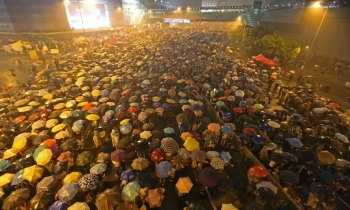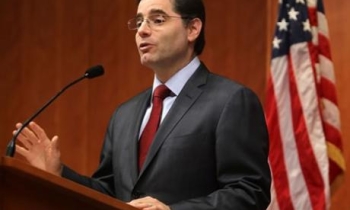Bob Woodward's journalism career has come a long way - from obscure police reporter to star of the Washington Post and one of the country's most recognizable journalists.
Now the Watergate reporter whose stories brought down President Richard M. Nixon is tangled in a web of Washington journalists involved with the Bush administration's leak of Valerie Plame's secret identity as a CIA operative. And he's coming under increasingly heavy criticism for his role.
Woodward has said a White House source gave her name to him two years ago. But, in a breach of accepted newsroom practices, he never told his editor, even as the Plame case heated up. While withholding that crucial information, he also criticized Patrick J. Fitzgerald, the special prosecutor who is investigating the Plame case, on national television and radio.
Many in the journalism world believe Woodward didn't adhere to basic journalism standards, and appears to have ignored a troubling conflict of interest. Nor is the Post itself unblemished by allowing Woodward to function as a protected newsroom star.
"You have to hold to the same standard of journalism (for) every story," said Gregory E. Favre, who worked 47 years as an editor and managing editor. "Every newsroom has its stars, but you can't have a different standard for stars."
Deborah Howell, the Post's ombudsman, recently described Woodward's job this way:
"While Woodward is listed as an assistant managing editor, he has no management duties. He comes and goes as he pleases, mostly writing his best-selling books on what happens behind the doors of power, and he reports only to Executive Editor Len Downie. He is allowed to keep juicy stories to himself until his latest book is unveiled on the front page of the Post. He is the master of the anonymous source."
Woodward's reporting over the past few years has featured many unnamed sources, sympathetic portrayals of President Bush and what many believe is an uncomfortably close relationship to his sources.
The irony is that Woodward, as Favre said, "is a superlative reporter" - at least he is when he plays by the journalistic rules. And one rule hasn't changed.
"If Woodward wants to write books that's fine, but he has to realize his first obligation is to his newspaper and the reader," added Favre, a former president of the American Society of Newspaper Editors and current distinguished fellow in journalism values for the Poynter Institute. "No individual is bigger than the newspaper, and no individual has a right to damage the paper."
Woodward, as Howell pointed out, also needs editorial supervision.
Favre agreed. "Woodward needs an editor, I need an editor and everybody needs an editor. Does that mean Woodward has to tell Len Downie everything he's doing? No, but on a story as big as Valerie Plame, Downie had a right to know and Woodward should have told him."
Last year, Woodward was here to speak at the University at Buffalo. During a telephone interview with The News prior to his appearance he was asked about balancing his job at the Post with writing books filled with newsworthy information that is held back until the book is published.
"You agonize and think about it," Woodward said. "You talk to editors about it."
Woodward was asked about reporting on the doubts of weapons of mass destruction before the war began. He said he was working on such a story for the Post, while doing his book.
"I had a draft of the story; had it run...," Woodward said, not finishing the sentence. "But you know, it was on the eve of war, and no one was saying there aren't weapons there."
Woodward added, "Most of the serious reporting on this war was done after the war began."
That is deeply regrettable - not only for America but also for journalism.
e-mail: aviolanti@buffnews.com









